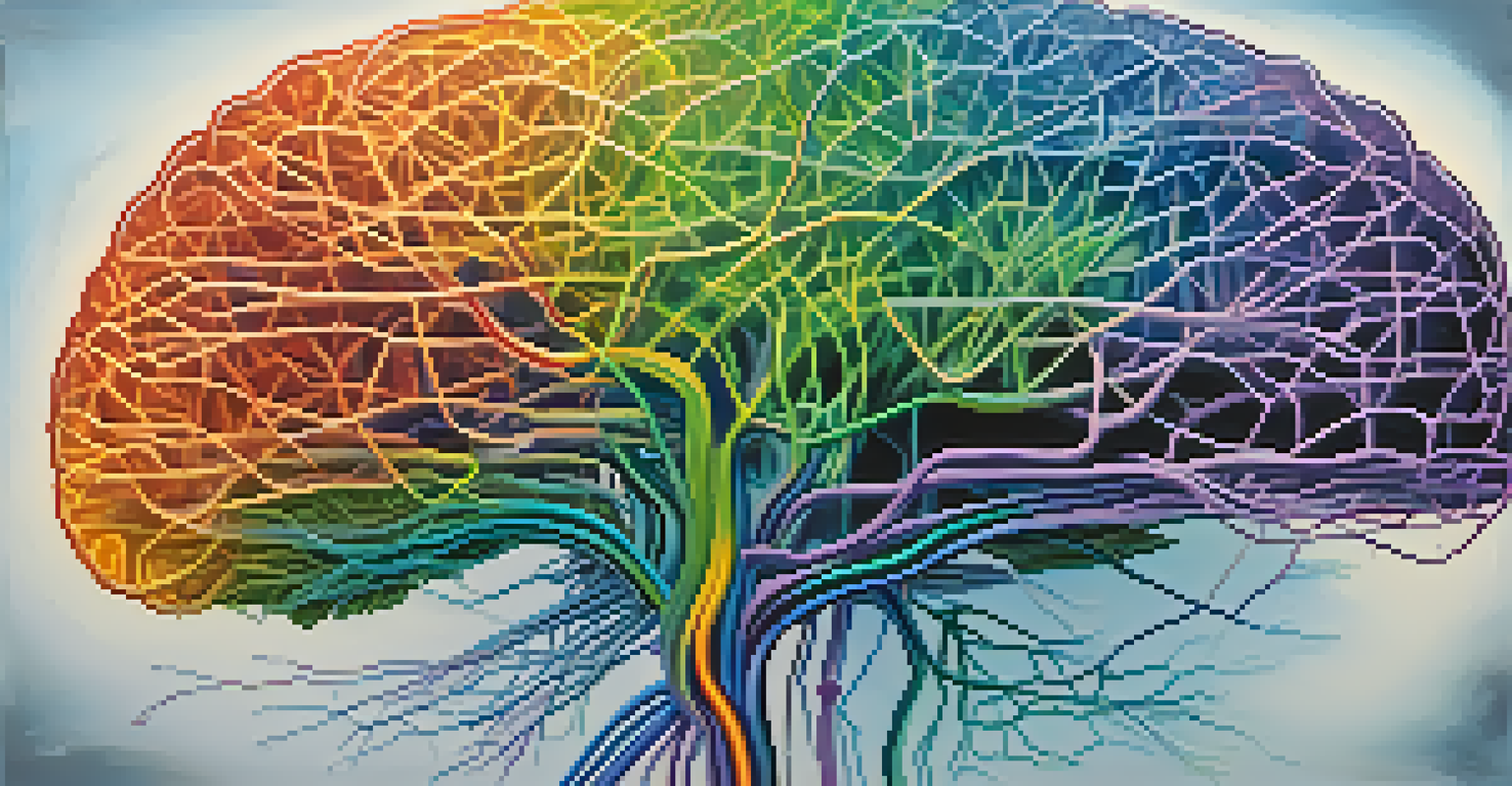The Risks and Benefits of Using Marijuana for Mental Health

Understanding Marijuana's Role in Mental Health
Marijuana, derived from the cannabis plant, has garnered attention for its potential effects on mental health. Many users report relief from anxiety, depression, and PTSD symptoms, leading to a growing interest in its therapeutic benefits. However, it's essential to consider the complexities of these effects and how they vary from person to person.
The medical use of marijuana has been shown to relieve symptoms in patients with conditions such as anxiety, depression, and PTSD.
The active compounds in marijuana, particularly THC and CBD, interact with the brain's receptors, which can influence mood and perception. While THC is known for its psychoactive effects, CBD is often highlighted for its calming properties. This duality makes marijuana a unique option for those seeking alternative treatments for mental health issues.
As research continues to evolve, understanding marijuana's impact on mental health requires a nuanced approach. It's not just about whether it helps or harms; it's about how it fits into an individual's overall mental health strategy.
Potential Benefits of Marijuana for Mental Health
One of the most commonly reported benefits of marijuana is its ability to reduce anxiety. Many users find that it helps them manage stress and feel more relaxed, which can be particularly beneficial for those with anxiety disorders. Anecdotal evidence supports the idea that marijuana can be a helpful tool for temporary relief from overwhelming feelings.

In addition to anxiety, marijuana has been noted for its potential role in alleviating symptoms of depression. Some studies suggest that certain strains may enhance mood and provide a sense of euphoria. This effect can be a double-edged sword, as it may offer short-term relief but doesn't address the root causes of depression.
Marijuana's Mixed Effects on Mental Health
Marijuana can offer relief for anxiety and PTSD, but its impact varies widely among individuals.
For individuals with PTSD, marijuana may serve as a means to cope with intrusive thoughts and flashbacks. The calming effects of CBD, in particular, have been linked to improved sleep and reduced nightmares, which can be crucial for those struggling with traumatic memories.
The Risks of Using Marijuana for Mental Health
Despite its potential benefits, marijuana use is not without risks. One significant concern is the possibility of exacerbating anxiety or paranoia, especially in inexperienced users or those consuming high-THC strains. This paradox highlights the importance of dosage and individual response when considering marijuana for mental health.
Cannabis is a complex plant with a multitude of effects, and what works for one person may not work for another.
Another risk involves the potential for dependency. Regular use of marijuana can lead to a psychological reliance, where individuals may feel they need it to function. This dependency can complicate mental health treatment and lead to withdrawal symptoms when not using the substance.
Moreover, marijuana use can affect cognitive function and memory, particularly in adolescents and young adults. As the brain continues to develop into the mid-20s, using marijuana during this period may have lasting effects on mental health and cognitive abilities.
Individual Differences in Marijuana's Effects
One of the key factors influencing how marijuana affects mental health is individual biology. Each person's endocannabinoid system, which interacts with cannabinoids from marijuana, is unique. This means that what works for one person may not work for another, making it essential to approach treatment on a case-by-case basis.
Genetic factors, previous mental health history, and current medications can all play a role in how someone responds to marijuana. For instance, individuals with a family history of mental illness may be at a higher risk of negative effects. Therefore, personalizing treatment is crucial to maximizing benefits while minimizing risks.
Risks of Marijuana Use Must Be Considered
While marijuana may help some users, it can also lead to increased anxiety, dependency, and cognitive issues.
Additionally, the setting in which marijuana is consumed can greatly affect its impact. Using marijuana in a safe, supportive environment may enhance its positive effects, while using it in high-stress situations could lead to adverse experiences.
Legal and Social Considerations
The legal status of marijuana varies widely across regions, influencing accessibility and perceptions. In places where marijuana is legalized, there is often more focus on research and understanding its therapeutic uses. However, in areas where it remains illegal, stigma can prevent individuals from exploring its potential benefits for mental health.
Social perceptions of marijuana also play a crucial role in its use. While some view it as a legitimate therapeutic option, others may see it as a recreational drug with harmful consequences. These differing views can create barriers for individuals seeking help or support for their mental health needs.
Navigating these legal and social landscapes is essential for anyone considering marijuana as part of their mental health journey. Awareness of local laws and community attitudes can help individuals make informed decisions about their treatment options.
Integrating Marijuana into Mental Health Treatment
If you're considering using marijuana as part of your mental health treatment, it's essential to approach it thoughtfully. Consulting with a healthcare professional who understands both mental health and the effects of marijuana can provide valuable guidance. They can help you navigate the complexities and determine if it's a suitable option for you.
It's also important to consider marijuana as one component of a broader mental health strategy. Therapy, lifestyle changes, and medication may all play vital roles in achieving overall well-being. By integrating marijuana mindfully, you can create a holistic approach that addresses your unique mental health needs.
Individual Differences Matter
Personal biology and environmental factors significantly influence how marijuana affects each person's mental health.
Keeping a journal to track your experiences with marijuana can also be beneficial. By documenting how it affects your mood and anxiety levels, you can gain insight into its role in your mental health journey, helping you and your healthcare provider make informed decisions.
Future Research on Marijuana and Mental Health
As the conversation around marijuana and mental health evolves, ongoing research is crucial. Scientists are exploring various strains, dosages, and methods of consumption to better understand their effects on mental health conditions. This research can shed light on which populations might benefit the most and how to minimize risks.
Furthermore, understanding the long-term effects of marijuana use on mental health is essential for developing comprehensive treatment plans. As more states legalize marijuana, researchers have greater access to study its effects in diverse populations, potentially leading to breakthroughs in mental health treatment.

Ultimately, the future of marijuana in mental health care looks promising, but it requires careful study and open-mindedness. As we gather more data, we can make more informed decisions about how to best use this complex substance for mental health support.